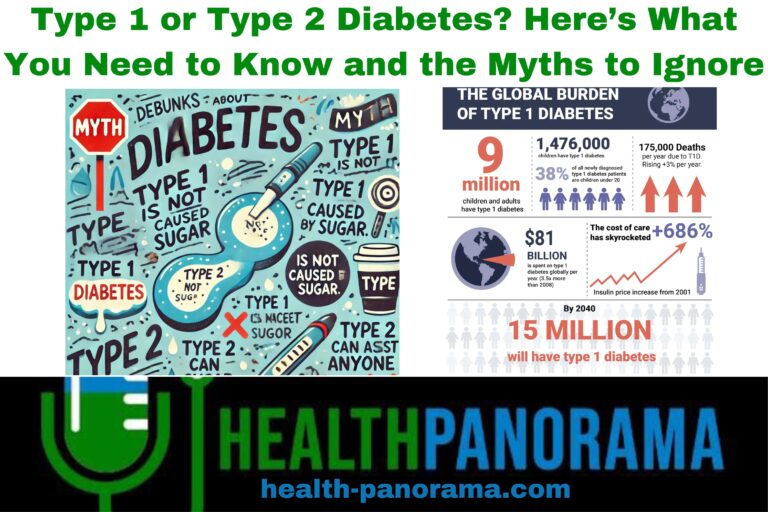Diabetes is a significant global health concern, affecting millions and accounting for a substantial portion of chronic illness. However, confusion between the types of diabetes—Type 1 and Type 2—persists, leading to myths and misconceptions that can hinder effective management and public understanding.
What is Type 1 Diabetes?
Type 1 diabetes is an autoimmune disease in which the body’s immune system mistakenly attacks insulin-producing beta cells in the pancreas. As a result, individuals with Type 1 diabetes produce little to no insulin, the hormone that regulates blood sugar levels. This condition often manifests early in life, typically in childhood or adolescence, but can develop at any age.
Current Data: According to the International Diabetes Federation (IDF), approximately 10% of all diabetes cases globally are Type 1. The CDC reports that in the United States alone, around 1.9 million people have Type 1 diabetes.
What is Type 2 Diabetes?
Type 2 diabetes, the more common form, occurs when the body becomes resistant to insulin or when the pancreas fails to produce enough insulin. This type often develops in adults, though it is increasingly diagnosed in children due to rising rates of obesity and sedentary lifestyles.
Current Data: Type 2 diabetes accounts for roughly 90% of diabetes cases worldwide. The IDF estimates that in 2023, over 537 million adults were living with diabetes, and this number is projected to reach 643 million by 2030 if current trends continue.
Key Differences Between Type 1 and Type 2 Diabetes
Cause:
Type 1 is autoimmune and not linked to lifestyle or diet.
Type 2 is associated with lifestyle factors such as obesity, lack of physical activity, and poor diet, although genetic predispositions also play a role.
Onset:
Type 1 typically develops suddenly and is most common in younger individuals.
Type 2 develops gradually over time, often unnoticed until significant symptoms occur.
Management:
Type 1 requires lifelong insulin therapy and careful monitoring of blood glucose levels.
Type 2 can often be managed or even reversed with lifestyle changes, oral medications, and sometimes insulin therapy.
Debunking Myths and Misconceptions
Myth 1: Only Overweight People Get Diabetes While being overweight is a significant risk factor for Type 2 diabetes, it is not the sole cause. Many individuals with Type 2 diabetes have a normal body mass index (BMI). Type 1 diabetes, on the other hand, has no correlation with weight.
Myth 2: Type 1 and Type 2 Are Managed in the Same Way While both types involve blood sugar management, the approaches differ. Type 1 diabetes requires external insulin administration as the body cannot produce it. In contrast, Type 2 diabetes management may initially focus on lifestyle interventions and oral medications before transitioning to insulin if necessary.
Myth 3: Sugar Consumption Causes Diabetes Type 1 diabetes is not caused by sugar intake; it is autoimmune in nature. Type 2 diabetes results from insulin resistance and metabolic dysfunction, which can be exacerbated by high sugar intake but is not caused solely by it.
The Current Landscape and Future Directions
Recent advancements in diabetes treatment and technology have significantly improved management options. Continuous glucose monitors (CGMs) and insulin pumps are now widely used for Type 1 diabetes, allowing for better blood sugar control. Meanwhile, for Type 2 diabetes, innovative medications like SGLT2 inhibitors and GLP-1 receptor agonists have proven effective in managing blood sugar and supporting weight loss.
Statistics Highlight: The World Health Organization (WHO) reports that diabetes was directly responsible for an estimated 1.5 million deaths in 2019. Early detection and comprehensive management can help reduce the risk of complications such as heart disease, kidney failure, and vision loss.
An endocrinologist at the Lagos University Teaching Hospital, Prof. Femi Fasanmade, in a recent interview with The Punch, discussed the challenges in accessing diabetes care.
He said, “Diabetes places an extra burden on individuals and families affected, especially for the majority of patients unable to access quality health care.”
World Diabetes Day is held on November 14 each year. It is the primary global awareness campaign focusing on diabetes mellitus and is led by the International Diabetes Federation.


